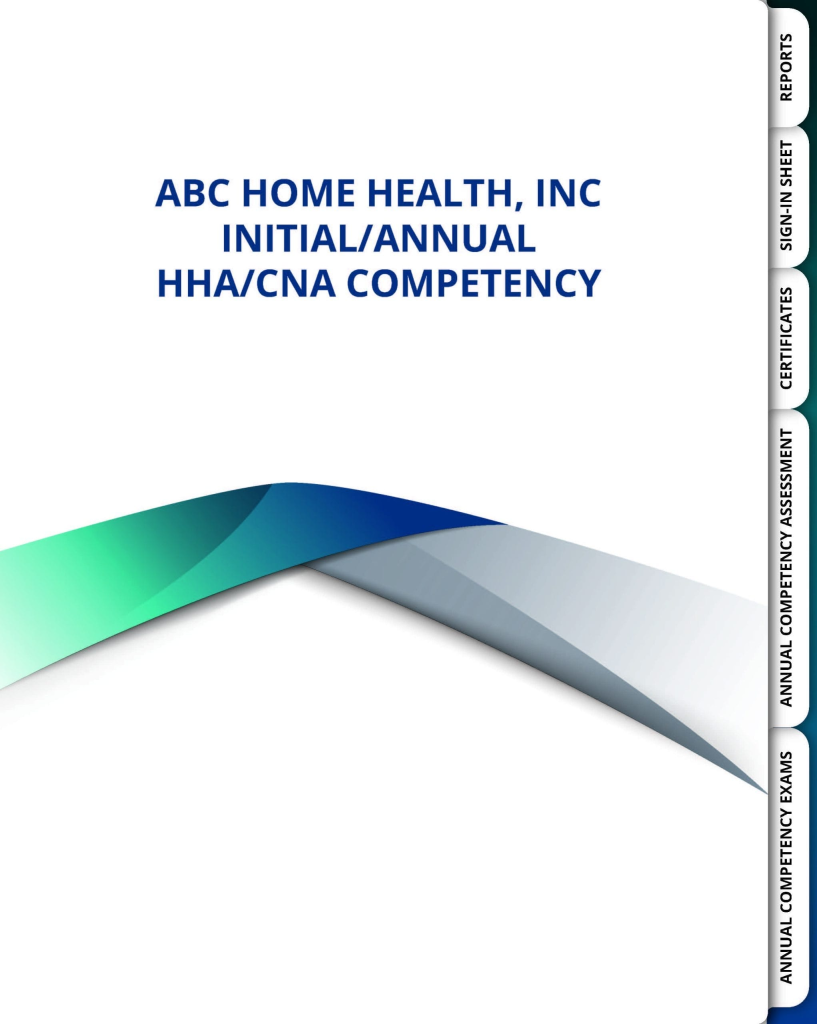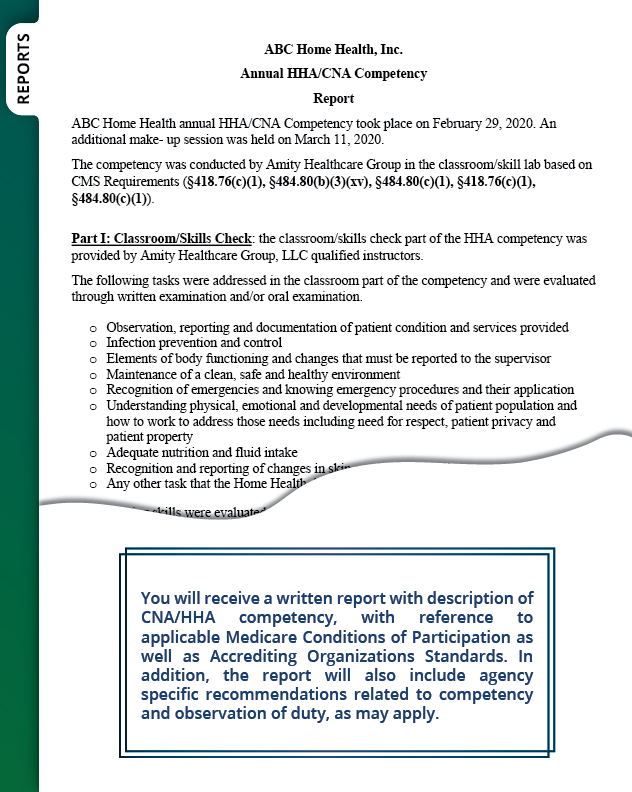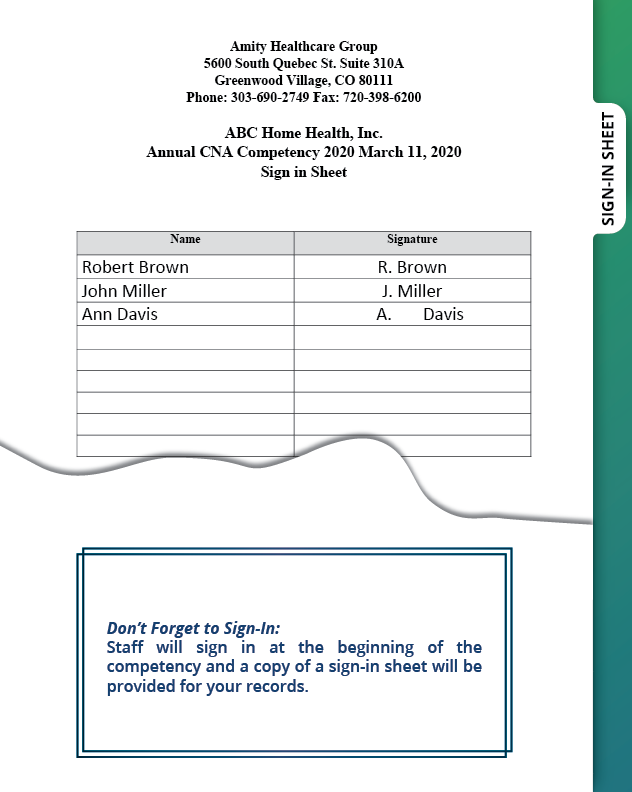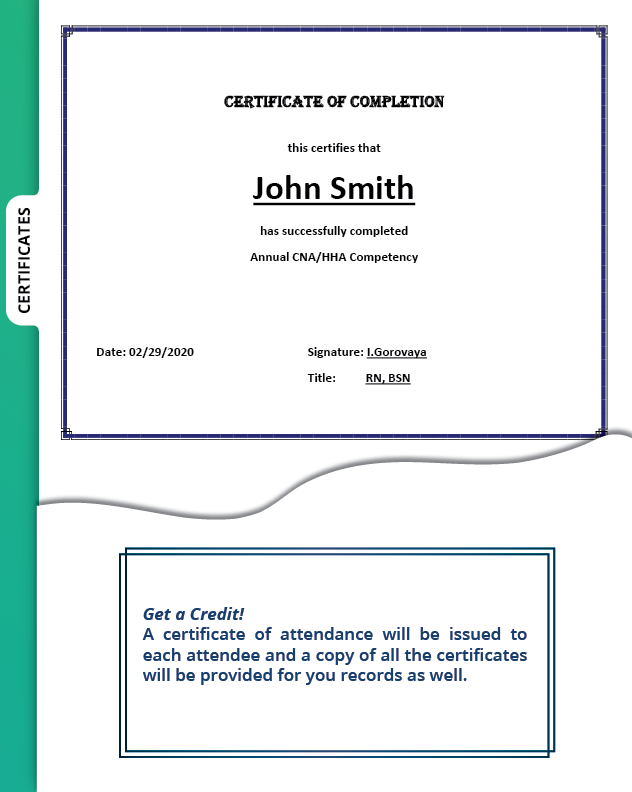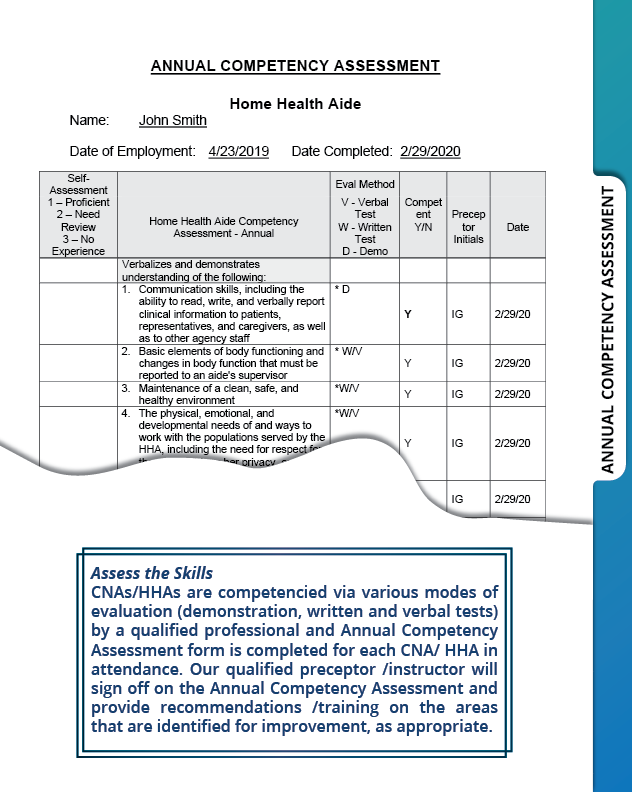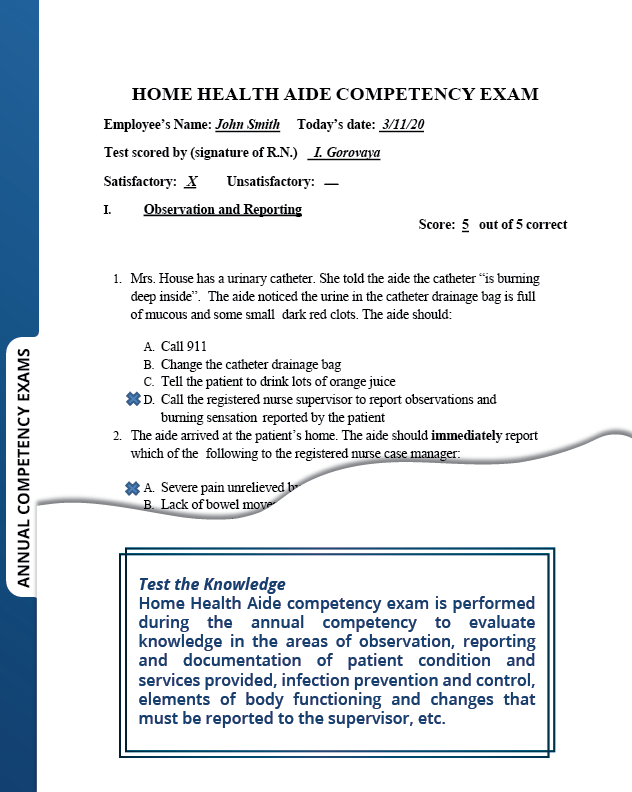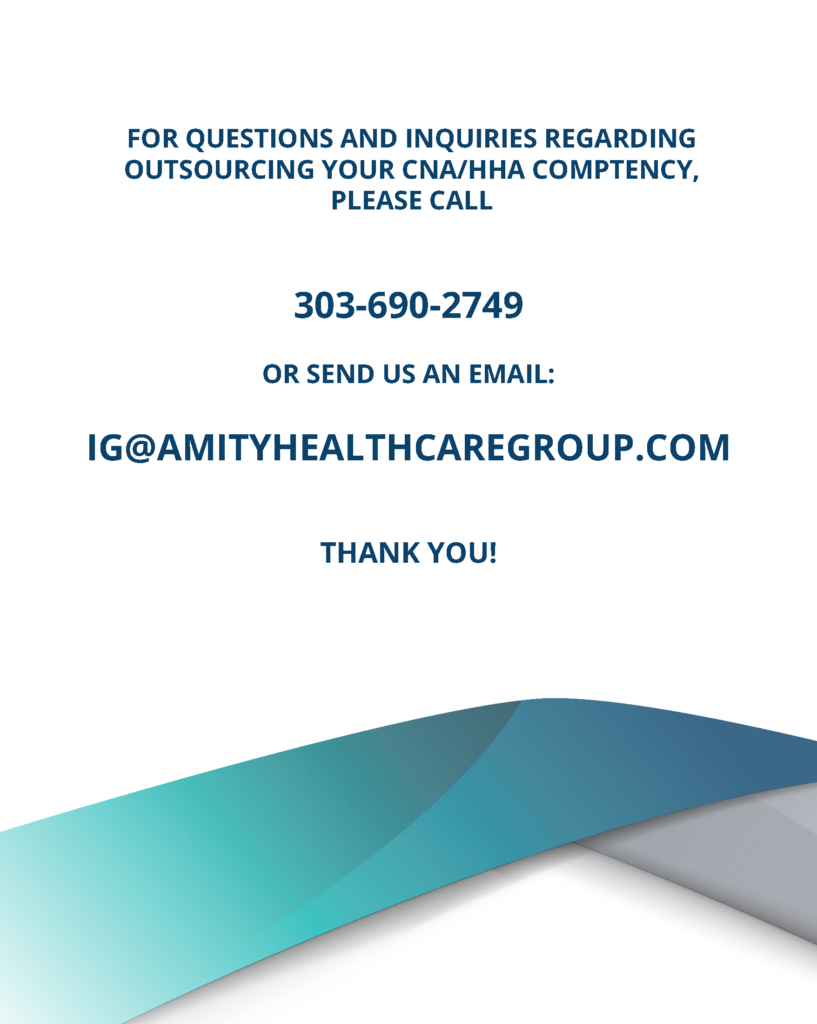Hello, everyone!
HAPPY HANUKKAH!
Here are some home health related updates for this week:
AMITY’S NEWS
Next available CNA/HHA and Skilled Nursing Competency is Tuesday, December 15th, 2020 and Thursday, December 17th, 2020.
If you would like to register your Skilled Nurses and/or HHAs/CNAs for a competency, please follow the links below:
Skilled Nursing Competency: https://amityhealthcaregroup.com/services/nursing-competencies/
HHA/CNA Competency: https://amityhealthcaregroup.com/services/cna-hha-competency/
Let Amity Healthcare Group to assist you with staying compliant with competency and ongoing training/continued education requirements in a worry-free manner.
For more information, please call 303-690-2749 or email: ig@amityhealthcaregroup.com.
NATIONAL NEWS
Important Dates to Remember
January 1, 2021 is just around the corner. Please remember the following important changes that are coming on January 1, 2021:
- Home Infusion Therapy: As the result of provisions of the Cures Act, beginning on January 1, 2021 there will be a new Medicare benefit – Home Infusion Therapy(HIT). With the introduction of HIT, the professional services related to the provision of Part B infusion drugs via IV pump will no longer be covered under the Medicare home health benefit. As the result, if your organization is not accredited as a Home Infusion Therapy provider, you will no longer be able to accept patients who require administration of Part B IV drugs via IV pump (please note that only administration of drugs via IV Pump is effected). If you have current patients on service who require administration of Part B IV drugs via IV pump, consider a plan to transition these patients to accredited HIT providers.
Please see attached Home Infusion Therapy fact sheet and FAQ provided by NAHC
- Home Health No Pay RAPs : Home Health Agencies will be required to submit a request for anticipated payment (RAP) that will be paid at 0%, prior to each claim.
- Penalty for a Delayed RAP: The No Pay RAP must be submitted and accepted into the system within 5 calendar days after the start of care date for the first 30‐day period of care in a 60‐day certification period and within 5 calendar days after the “from date” for the second 30‐day period of care in the 60‐day certification period.
Please see attached No Pay RAP fact sheet and FAQ provided by NAHC
Most Common Home Health Claims Reasons for Denials
Resource: CGS Administrators, LLC C2C Demo, originated November 2020
CGS published review of denials (most common reasons for denials) for the month of October, 2020. GGS prepares this information as a tool to assist providers in reducing the number of denials. Please utilize the information below for staff training and education, as may be appropriate.
- Home Health – Documentation did not support the need for skilled services (88.89%)
For any home health services to be covered by Medicare, the patient must meet the qualifying criteria as specified in §30, including having a need for skilled nursing care on an intermittent basis (§40.1, §40.1.1), physical therapy, speech-language pathology services, or a continuing need for occupational therapy as defined in §40.2 and §40.2.1. Skilled nursing services are necessary only when (a) the particular patient’s special medical complications require the skills of a registered nurse or, when provided by regulation, a licensed practical nurse to perform a type of service that would otherwise be considered non-skilled; or (b) the needed services are of such complexity that the skills of a registered nurse or, when provided by regulation, a licensed practical nurse are required to furnish the services. The service must be so inherently complex that it can be safely and effectively performed only by, or under the supervision of, professional or technical personnel as provided by regulation, including 42 C.F.R. 409.32. A patient’s overall medical condition, without regard to whether the illness or injury is acute, chronic, terminal, or expected to extend over a long period of time, should be considered in deciding whether skilled services are needed. A patient’s diagnosis should never be the sole factor in deciding that a service the patient needs is either skilled or not skilled. Skilled care may, depending on the unique condition of the patient, continue to be necessary for patients whose condition is stable.
The home health clinical notes must document as appropriate:
- the history and physical exam pertinent to the day’s visit, (including the response or changes in behavior to previously administered skilled services) and the skilled services applied on the current visit, and
- the patient/caregiver’s response to the skilled services provided, and
- the plan for the next visit based on the rationale of prior results,
- a detailed rationale that explains the need for the skilled service considering the patient’s overall medical condition and experiences,
- the complexity of the service to be performed, and
- any other pertinent characteristics of the beneficiary or home
Clinical notes should be written so that they adequately describe the reaction of a patient to his/her skilled care and provide a clear picture of the treatment, as well as “next steps” to be taken. Vague or subjective descriptions of the patient’s care should not be used. For example, terminology such as the following would not adequately describe the need for skilled care:
- Patient tolerated treatment well
- Caregiver instructed in medication management
- Continue with POC
Objective measurements of physical outcomes of treatment should be provided and/or a clear description of the changed behaviors due to education programs should be recorded in order that all concerned can follow the results of the applied services.
To be covered as skilled therapy, the services must require the skills of a qualified therapist and must be reasonable and necessary for the treatment of the patient’s illness or injury. Coverage does not turn on the presence or absence of an individual’s potential for improvement, but rather on the beneficiary’s need for skilled care.
The service of a physical therapist, speech-language pathologist, or occupational therapist is deemed reasonable and necessary if the complexity of the service is such that it can be performed safely and/or effectively only by or under the general supervision of a skilled therapist. To be covered, assuming all other eligibility and coverage criteria have been met, the skilled services must also be reasonable and necessary to the treatment of the patient’s illness or injury or to the restoration or maintenance of function affected by the patient’s illness or injury. It is necessary to determine whether individual therapy services are skilled and whether, in view of the patient’s overall condition, skilled management of the services provided is needed.
The beneficiary’s medical condition is a valid factor in the determination of medical necessity; however, the diagnosis or prognosis should not be the only factor in determining medical necessity of therapy services. The question to be answered is whether the services can be completed by unskilled personnel.
To be considered reasonable and necessary for the treatment of the illness or injury:
- The services must be consistent with the nature and severity of the illness or injury, the patient’s medical needs, including the requirement that the amount, frequency, and duration of the services must be reasonable; and
- The services must be considered, under accepted standards of medical practice, to be specific, safe, and effective treatment for the patient’s condition, meeting the standards noted below. The home health record must specify the purpose of the skilled service provided.
The therapist must document measurable results in the initial therapy assessment and include it in the reassessment that is to be performed at least every 30 days.
Suggestion:
Clinical notes should provide communication records between the entire home care team and clearly document the need for the skilled service. This can include a clear, concise history and physical exam on the date of the visit which notes changes in behavior and the skilled services provided during the visit. Additionally, it is important to note the patient’s and caregiver’s response to the skilled service provided as well as the plan for further visits. A detailed note describing the rationale for the skilled service, the complexity of the service, and any pertinent characteristics of the beneficiary or environment where he/she is receiving care.
Guidelines:
CMS IOM Pub. 100-02, Medicare Benefit Policy Manual (MBPM), Chapter 7 – Home Health Services – https://www.cms.gov/Regulations-and-Guidance/Guidance/Manuals/Downloads/bp102c07.pdf
Sections 40.1.1 (General Principles Governing Reasonable and Necessary Skilled Nursing Care),
Sections 40.2 (Skilled Therapy Services), and 40.2.1 (General Principles Governing Reasonable and Necessary Physical Therapy, Speech-Language Pathology Services, and Occupational Therapy)
- Home Health – Certification/POC signature missing or invalid (11.11%)
The home health agency (HHA) must be acting upon a physician plan of care (POC) that meets the requirements. For services to be covered the POC must indicate the services necessary to meet the patient’s needs as identified in the comprehensive assessment. The POC must also identify the disciplines that will provide the services, the frequency of the services and the duration of the services, as well as any items listed in 42 CFR 484.60(a) that establish the need for the services (§30.2.1). The physician who signs the plan of care must be qualified to sign the physician certification as described in 42 CFR 424.22 (§30.2.3)
The plan of care or oral order may be transmitted by facsimile. The HHA is not required to have the original signature on file. However, the HHA is responsible for obtaining original signatures if an issue surfaces that would require verification of an original signature (§30.2.7).
HHAs that maintain patient records by computer rather than hard copy may use electronic signatures. However, all such entries must be appropriately authenticated and dated. Authentication must include signatures, written initials, or computer secure entry by a unique identifier of a primary author who has reviewed and approved the entry. The HHA must have safeguards to prevent unauthorized access to the records and a process for reconstruction of the records in the event of a system breakdown (§30.2.8).
Suggestion:
Prior to submission of claim, ensure the home health certification/plan of care includes a valid physician signature. The signature must be of the physician listed as the “certifying physician” on the plan of care. An attestation may also be submitted to verify signatures.
Guidelines:
CMS IOM Pub. 100-02, Medicare Benefit Policy Manual (MBPM), Chapter 7 – Home Health Services – https://www.cms.gov/Regulations-and-Guidance/Guidance/Manuals/Downloads/bp102c07.pdf
Sections 30.2.1 (Content of the Plan of Care), 30.2.3 (Who Signs the Plan of Care), 30.2.7 (Facsimile Signatures), and 30.2.8 (Alternative Signatures).
COLORADO NEWS
Important Dates to Remember
January 1, 2021 is just around the corner. Please remember the following important changes that are coming on January 1, 2021:
Electronic Visit Verification: Please remember that effective January 1, 2021, claims without corresponding EVV will deny. ALL claims submitted to HCPF that require EVV records must be matched to valid EVV records to pay. January 1, 2021 also marks the beginning of tying EVV compliance directly to the Colorado Medicaid Provider Agreement.
Amity’s Friday emails (newsletters) will be archived on Amity’s Healthcare Group website at https://amityhealthcaregroup.com/resources/ under Weekly Newsletter section.
Please do not hesitate to reach out for any assistance or questions via email, phone or website at https://amityhealthcaregroup.com/resources/
If you wish to forward this email to your colleague or friend, please feel free to do so. If you received this message as a forward, we invite you to subscribe to our communications at https://amityhealthcaregroup.com/ (look for “Subscribe to Listserv” in the top corner). If you wish to unsubscribe from this email distribution list, please email to eg@amityhealthcaregroup.com
Thank you,
Irina Gorovaya, RN BSN, MBA
Amity Healthcare Group, LLC
Home Health Consulting, Education and Outsourcing Services
720-353-7249 (cell) 303-690-2749 (office) 720-398-6200 (fax)

